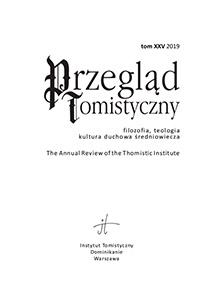TOMASZ STĘPIEŃ, The immaterial Character of Angelic Cognition according to Saint Thomas Aquinas

Volume XXI: 2015
Philosophy — Theology— Spiritual Culture of the Middle Ages
ISSN 0860-0015
e-ISSN 2544-1000
SUMMARY
This article concerns two main topics of Saint Thomas’ conception of angelic cognition: the problem of angelic intellectual power and angelic knowledge of individual material substances. These problems are concerned with the aspect of the new idea of angelic nature, which, according to Aquinas, is absolutely immaterial. Saint Thomas refuted the hylomorphic claims of his predecessors, in which separate substances are composed of form and intellectual matter, by introducing his metaphysics of the act of being (ipsum esse). The composition of the act of being and essence in angelic nature shows the differences between angels and God (who alone is the pure act of being) and between the angels themselves. This makes claims about the presence of intellectual matter in the nature of angels refutable. Aquinas consequently uses the methodological scheme of substance, powers and operations, which he acquired from Pseudo-Dionysius the Areopagite. Therefore, his claims about the nature of angels play an important role in resolving the problems of angelic cognition.
Saint Thomas shows that, in angelic nature, there is no necessity to divide the intellect into passive and active. Angels have only one intellect, which relies only on the innate species given by God at the moment of their creation. These species in the angelic intellect have a different nature than those present in the intellect of man. They are not acquired from material beings through abstraction; thus, an angel does not need to have an active intellect. While Saint Bonaventure, like other thirteenth century scholars, claimed that the species in the angelic intellect are just like the species in the intellect of man, but more perfect, Saint Thomas considers them in their likeness with the perfect knowledge of God. In this way, he is able to explain why they can provide true and exact knowledge about individual material beings. This new perspective in which Aquinas considers angelic knowledge is possible thanks to the previous approach to angelic nature as absolutely immaterial.
